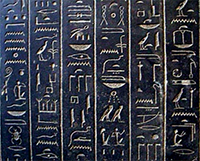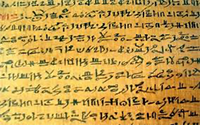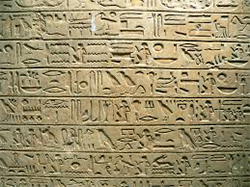Hieroglyphs of Ancient Egypt
The Ancient Egyptians used pictures tell stories and to relate facts and figures. The Egyptians regarded these characters as sacred, the creation of Thoth, god of knowledge. The name for these pictures was hieroglyphs (from the Greek hiero, meaning "holy," and glypho, meaning "writing." These hieroglyphs date to the earliest years of Egyptian civilization. The three types of characters were these:
The number of characters exceeded a thousand for a time, and the scribes who wrote them on papyri and carved them into pillars and temple walls had to memorize them all. When creating them, they did not use punctuation or spaces between characters. Thus, it was exceedingly difficult for anyone who didn't "speak" the  language to understand what they were seeing. An inconsistency came in the direction in which the characters were intended to be read. Sometimes, the "words" proceeded from left to right; other times, the intention was for the characters to be read from right to left. The direction that the carving of a human or animal figure was facing was a hint as to which direction to "read" the hieroglyphs. In other cases, the procession of characters went from top to bottom.
language to understand what they were seeing. An inconsistency came in the direction in which the characters were intended to be read. Sometimes, the "words" proceeded from left to right; other times, the intention was for the characters to be read from right to left. The direction that the carving of a human or animal figure was facing was a hint as to which direction to "read" the hieroglyphs. In other cases, the procession of characters went from top to bottom.

A new form of writing, hieratic, began about 2700 B.C. Hieratic looked much more like letters of an alphabet; it became the preferred mode of writing and maintained that status for a couple of centuries. 
An even simpler form of writing, Demotic, came along in the 7th Century B.C. Hieratic writing continued to feature in religious settings, but other scribes used Demotic characters for less sacred writing. A later language used in Egypt was Coptic, an alphabetic script that used the Greek letters; Coptic eventually became the most commonly used writing system. As Roman rule of Egypt continued, the use of hieroglyphs fell off precipitously. The last known dated hieroglyphic carvings were done in A.D. 396. 
The Egyptians revered hieroglyphs as sacred; the modern archaeologists who discovered hieroglyph-laden tomb and temple walls agreed but didn't know exactly what the ancient characters meant. It wasn't until 1822 that French scholar Jean-Francois Champollion announced that he could read hieroglyphs, thanks to painstaking work by many other people poring over the characters carved into the Rosetta Stone, which had the same words repeated in three languages: hieroglyphs, Demotic script, and Ancient Greek. A torrent of hieroglyph translation followed. |
|
Social Studies for Kids
copyright 2002–2026
David White



 Logograms stood for words.
Logograms stood for words.
